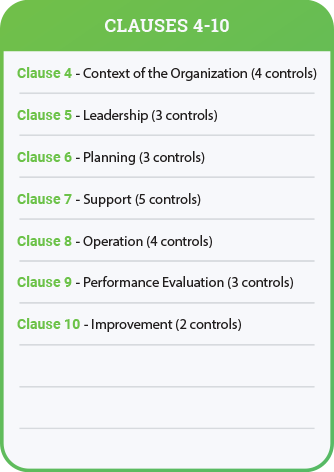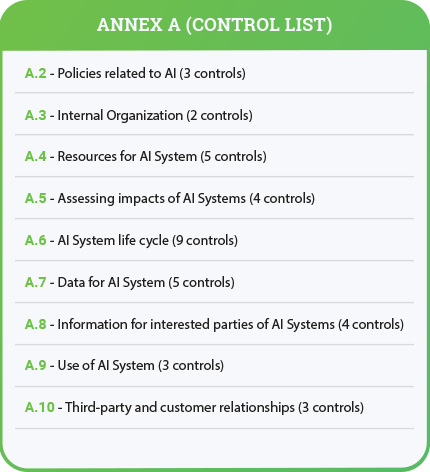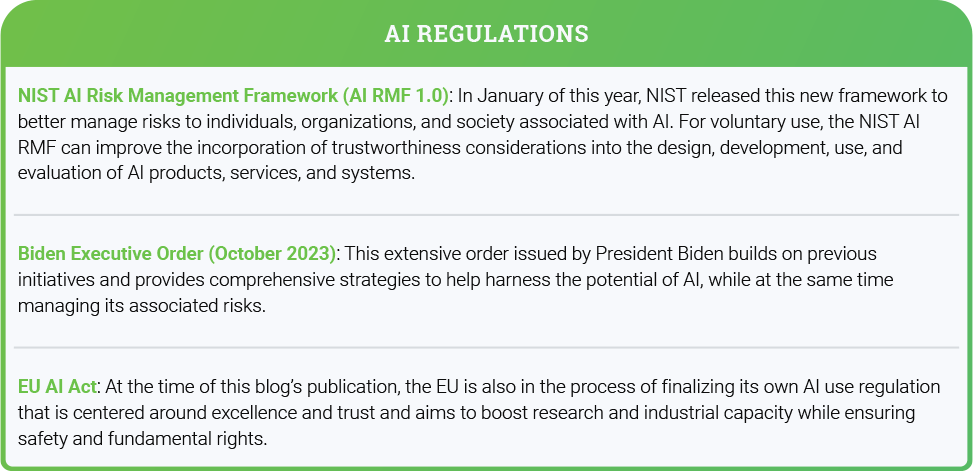April 9, 2024
Unlocking Responsible AI Management with ISO/IEC 42001: A Comprehensive Guide
As the cybersecurity landscape undergoes rapid evolution, the integration of Artificial Intelligence (AI) has emerged as a pivotal component. Consequently, ensuring the responsible development and usage of AI systems has risen to paramount importance, emphasizing the need for robust AI compliance measures. To address this need, the International Organization for Standardization (ISO) and the International Electrotechnical Commission (IEC) introduced ISO/IEC 42001, the world’s first AI management system standard. This groundbreaking standard provides organizations with a structured approach to managing AI projects, balancing innovation with governance, and addressing unique challenges such as ethical considerations, transparency, and continuous learning.
I. Definition of Standard
What is ISO/IEC 42001?
ISO/IEC 42001 specifies requirements for establishing, implementing, maintaining, and continually improving an Artificial Intelligence Management System (AIMS) within organizations. It is designed for entities providing or utilizing AI-based products or services, ensuring responsible development and use of AI systems.
ISO/IEC 42001 is the world’s first AI management system standard, providing valuable guidance for this rapidly changing field of technology. It addresses the unique challenges AI poses, such as ethical considerations, transparency, and continuous learning. For organizations, it sets out a structured way to manage risks and opportunities associated with AI, balancing innovation with governance.
The ISO/IEC 42001 standard offers organizations the comprehensive guidance they need to use AI responsibly and effectively, even as the technology is rapidly evolving. Designed to cover the various aspects of artificial intelligence and the different applications an organization may be running, it provides an integrated approach to managing AI projects, from risk assessment to effective treatment of these risks.
Who is ISO/IEC 42001 for, and does it apply for all AI Systems?
ISO/IEC 42001 is applicable to organizations of any size involved in developing, providing, or using AI-based products or services. It is relevant across all industries and is applicable to public sector agencies as well as companies or non-profits. Yes, it’s designed to be applicable across various AI applications and contexts.
II. Quick Overview
Standard Overview:
The standard has been drafted to follow the same structure and integrate with existing standards such as ISO 27001 (Information Security) and ISO 27701 (Privacy). While considering requirements of information security and privacy, ISO/IEC 42001 does not require organizations to have these standards as prerequisites.
What is an AIMS?
An AI management system, as specified in ISO/IEC 42001, is a set of interrelated elements intended to establish policies, objectives, and processes concerning the responsible development, provision, or use of AI systems. It provides requirements and guidance for establishing, implementing, maintaining, and continually improving an AI management system within the context of an organization.
Structure
The standard is broken into core clauses, normative, and informative annexes. The core clauses and normative annexes (A & B) outline key requirements and guidance for compliance with the standard for certification. The informative annexes (C & D) are mostly for informational purposes.
- Clauses 4-10:

- Annex A (Normative) – Control objectives and controls listing:

- Annex B (Normative): Provides implementation guidance for the controls listed in Annex A.
- Annex C (Informative) – Potential AI-related organization objectives and risk sources.
- Annex D (Informative) – Use of AI Management System across domains or sectors.
III. AI Cybersecurity Guidance / Regulation

IV. Timeline of Standard
There are currently no accreditation rules published governing procedures for certification bodies to perform audits to the new standard. It will take between 3 to 12 months for Certification Bodies to be able to provide certification depending on the accreditation body. Organizations can use this time period to start preparing for and implementing AIMS. They can leverage internal consulting like Tevora to help set up all the applicable documentation needed to comply with ISO/IEC 42001.
V. Services offered by Tevora
- Gap Assessment/Readiness Assessment: Tevora will conduct an assessment of your current environment to see how ready they are for the ISO/IEC 42001 standard. Upon completion, a list of gaps will be presented on what items the organization must address to pursue the actual certification process.
- Consulting Support/Preparation: Tevora will work with organizations post-gap assessment to help create policies, procedures, and implement controls that comply with ISO/IEC 42001 standards. This will include the creation of AIMS, SOA, and other mandatory documents.
- Internal Audit: Tevora will conduct a detailed internal audit for the requirements of the standard and then prepare a report to be distributed internally and with external certification bodies on the current state of AIMS.
In conclusion, ISO/IEC 42001 provides organizations with a structured approach to managing AI projects responsibly, ensuring ethical AI development and usage. With the support of consulting services like Tevora, organizations can navigate the complexities of AI management and achieve ISO/IEC 42001 certification, demonstrating their commitment to responsible AI practices.